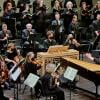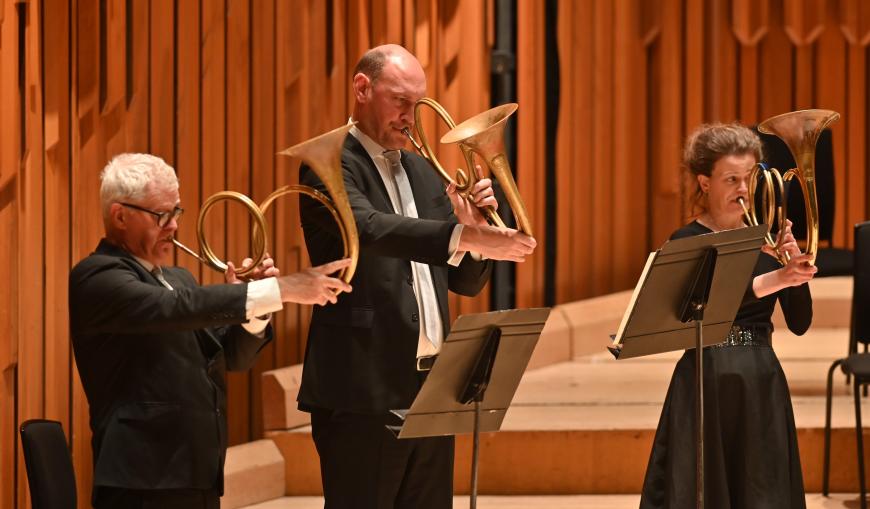
In 18th-century London, Lent entailed a pause in the production of operas, which were seen by churchmen as distractions from penitence. (Such officious censorship of culture is, of course, not unknown to us today.) Handel did an end run around the bishops’ moralistic stance, pouring his creativity into his oratorios, of which the best-known example is Messiah. Thus, Lenten audiences could enjoy musical entertainments in spite of the ban — but only if they were in English (not Italian), in concert form (no costumes, minimal action), and based on morally acceptable stories (usually from the Old Testament, not from racy romantic tales). Of Handel’s oratorios, one of the most magnificent is Solomon (1749), spectacularly performed Sunday at Cal Performances by the combined forces of The English Concert and the New York-based Clarion Choir. (The concert repeats at Los Angeles Opera on March 10.)
The English Concert, a London-based Baroque orchestra led by harpsichordist Harry Bicket, is well known for its blend of precision and expressivity, a combination that kept the over-three-hour-long oratorio continually refreshed and full of dramatic musical surprises.
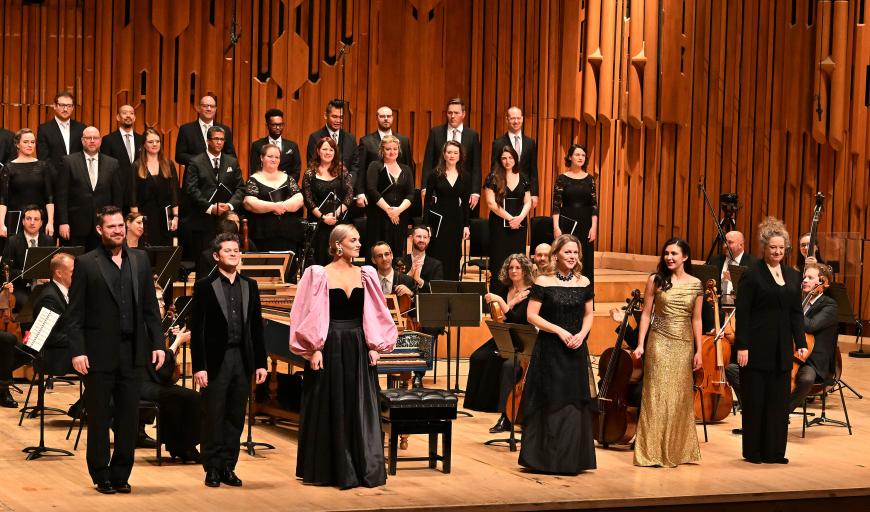
Bicket wasted not a moment — the tempos were always engaging and sometimes gaspingly bold, as in the famous “Arrival of the Queen of Sheba.” The orchestra played with admirable freedom, suspending time to lengthen the tenderer moments. The string sections did the hard lifting, playing every number and doing so with precision and sensitivity. Making the most of Solomon’s rich orchestration, Bicket’s group fashioned a rich and distinctly un-Lenten fare of musical festivity, adding oboes, bassoons, flutes, horns, trumpets, and drums for colorful effects and grand moments.
The central role, of course, is Solomon — king of a newly united and eye-poppingly prosperous Israel, famous for his wisdom as well as his wealth. The wonderful mezzo-soprano Ann Hallenberg brought the ancient king to life with confident assertiveness and easy theatricality. She won the audience over with Solomon’s very first aria (“What though I trace each herb and flower”) — a scientifically curious king who piously gives God all the credit yet wryly telegraphs his own pleasure in his ample intellect. Hallenberg’s diction was astoundingly clear, even in the unwelcoming acoustics of Zellerbach Hall, as she projected the anonymous librettist’s sometimes awkward verses with confidence and conviction.
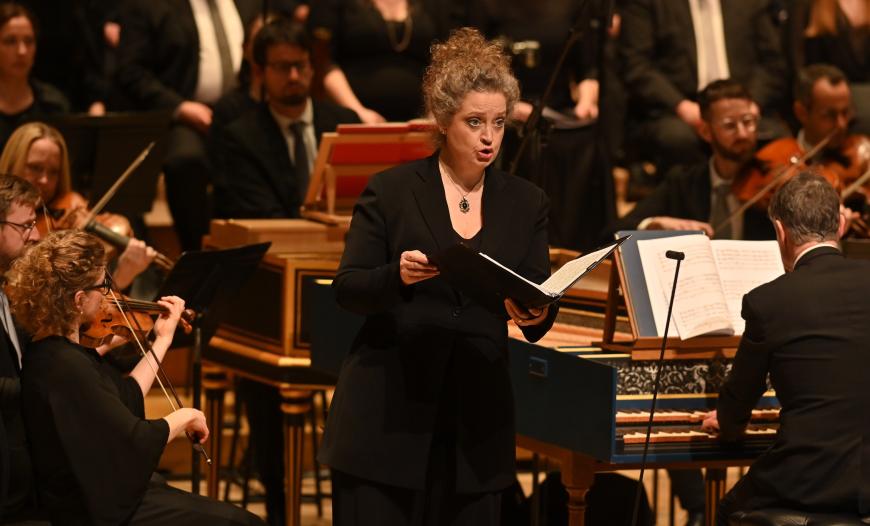
Solomon was attended by two priests. One is simply known as “A Levite” and was sung with proud authority by bass-baritone Brandon Cedel. The other is Zadok — a name perhaps familiar from Handel’s anthem “Zadok the Priest,” a piece of music we might expect to hear soon at Charles III’s coronation. The role was elegantly performed by tenor James Way.
The Bible makes no bones about the shadier aspects of Solomon’s reign (for example, his 700 wives and 300 concubines or his conspicuous worship of pagan gods), but Handel doesn’t go there. The narrative consistently presents the king as wise and virtuous — probably a nod to Handel’s patron, George II. Act 1 of the oratorio shows us a monogamous Solomon delighted to be wedded to his amorous Egyptian queen, tenderly sung by soprano Miah Persson. Thumbing his nose at the clerical authorities, Handel gives this happy couple a gorgeous love duet that leads Solomon to an aria of sexual urgency (“Haste to the cedar grove”), itself topped by the queen’s melting and equally eager response (“With thee th’unshelter’d moor I’d tread”), an elegant cousin of the popular 18th-century ballad “Over the Hills and Far Away.”
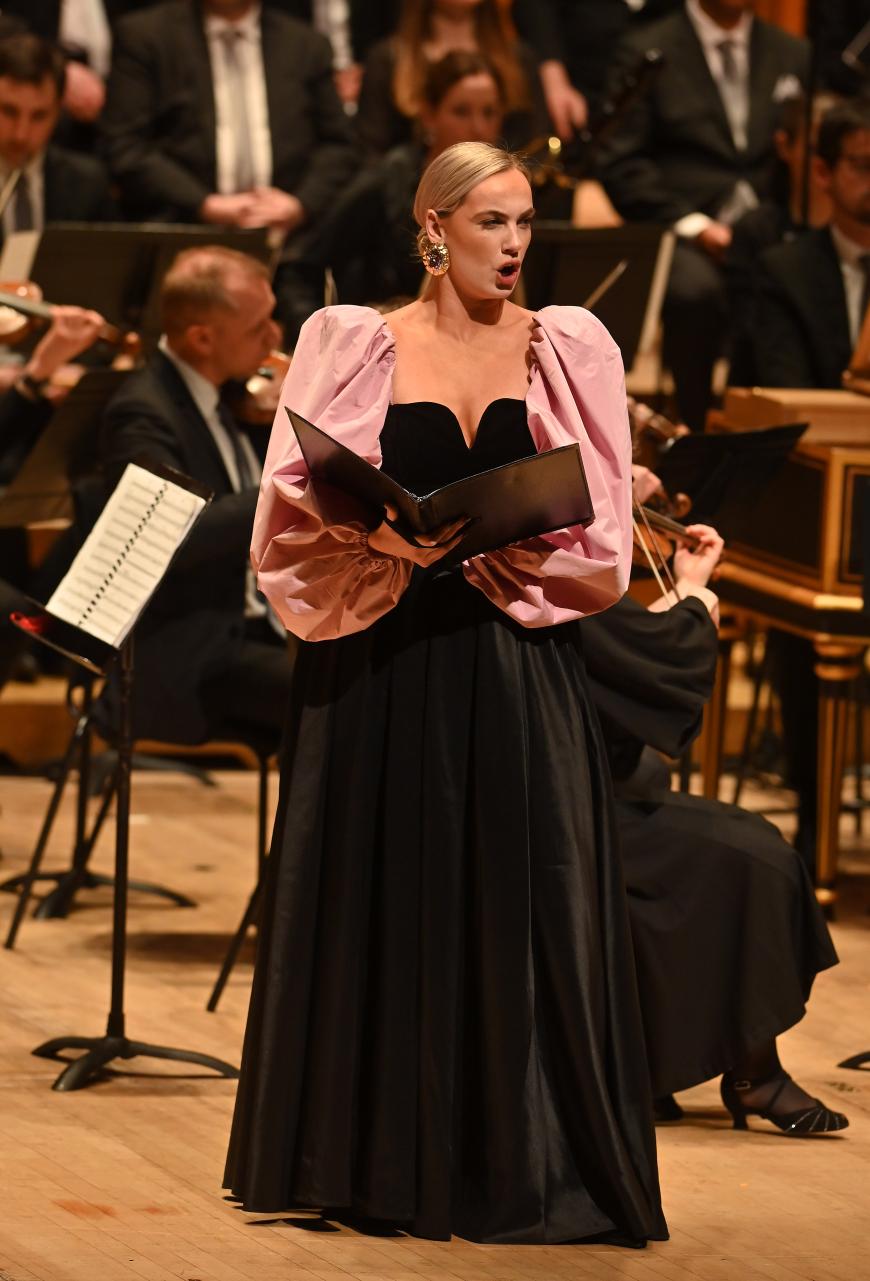
Act 2 deals with the most famous Solomon anecdote, the judgment of two women who each claim motherhood of a baby. The contending women were sharply differentiated — one (the true mother, here sung by Persson) is modest yet passionate, appalled by Solomon’s proposal to divide the baby, and the other, sung with appropriately haughty confidence by mezzo-soprano Niamh O’Sullivan, is smugly assured of victory over her rival. Hallenberg’s Solomon presided with sharp-eyed insight and humble gravity. It was obvious from the beginning who would get the child, but even so it made for compelling drama.
In almost every English translation of this episode (1 Kings 3:16), the women are called harlots or prostitutes. Cal Performances’ program notes acknowledge that Handel objected to such a label, yet the program itself called them harlots. Can’t we get beyond such terms for two apparently unwed mothers?
In Act 3, the Queen of Sheba takes over, visiting Solomon from Arabia. Enacted by soprano Elena Villalón, this “other” queen watches in awe as Solomon shows off his riches, his wisdom, and — in a wonderful choral sequence — the dazzling virtuosity of his court musicians. Villalón sang the role in rich, warm tones, beautifully matching the flirtatious motifs in the violins as she looked at Solomon with “ravish’d sight.” As she said farewell to her host in the famous aria “Will the sun forget to streak,” it was clear — though left unstated — that there had been more than a little chemistry between the two monarchs.
From beginning to end of the afternoon, the drama depended upon Handel’s spectacular choral writing and the accomplished singing of The Clarion Choir. Here was God’s plenty: stirring fugues, grand double-choir accolades, and eight-part songs of praise; a gentle evocation of the cedar grove where Solomon and his queen were to have their afternoon “nap”; and a stormy, high-romantic picture of unnamed lovers caught in some scenario of “death and wild despair.” The Clarion Choir never faltered even in the fastest and wordiest of passages. Bravo to the choir’s artistic director, Steven Fox, who also joined the tenor section, for his scrupulous attention to detail and insight into the musical heart of these remarkable numbers.
A video of this production of Solomon is slated to appear in The English Concert’s newly launched Handel for All, an ambitious plan to record the entirety of Handel’s output on video. I look forward to the chance to revisit this scintillating collaboration, online and free.



